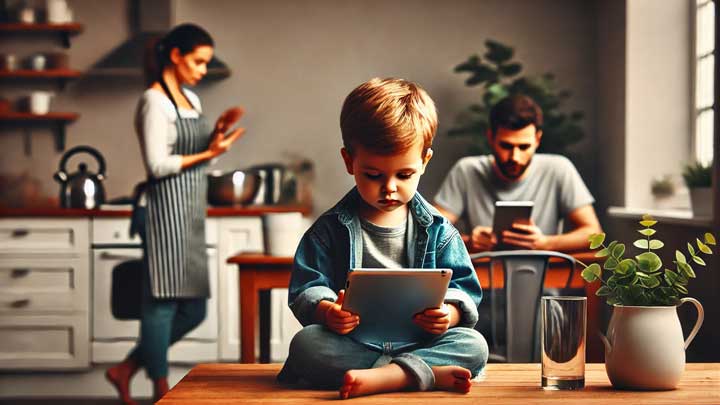
Attachment Parenting
Attachment parenting focuses on creating deep bonds through responsive care, empathy, and consistent nurturing for a child’s emotional well-being.
Home > Parenting Challenges > Parenting Mistakes > Using Technology as a Babysitter

It starts innocently—handing a tablet to a child so you can cook, clean, or catch your breath. But over time, that 10-minute break becomes the default. Technology becomes the go-to pacifier, the digital babysitter. While it buys temporary peace, the cost can be significant. Children raised with screens as their primary engagement risk delayed language, reduced creativity, weakened social skills, and physical stagnation. This article explores the dangers of relying on screens to raise kids—and how to reclaim real connection, movement, and growth.
Digital babysitting refers to the routine use of screens—phones, tablets, TVs, or computers—to occupy or calm a child in place of parental engagement, real-world interaction, or physical activity. While occasional screen time is not harmful, chronic reliance on it as a parenting tool shifts responsibility for stimulation, learning, and soothing from caregiver to device. This shortcut gradually becomes a substitute for bonding, conversation, and hands-on exploration—which are critical for healthy development.

Attachment parenting focuses on creating deep bonds through responsive care, empathy, and consistent nurturing for a child’s emotional well-being.

Parents often delay important talks, thinking kids are too young. But silence leads to confusion, misinformation, and fear. Here’s how to start talking—before it’s too late.

Buddy parenting builds a closer parent-child bond by emphasizing trust, friendship, and open communication. Learn how this style nurtures emotional and social growth.

Treating children equally doesn’t mean treating them the same. When we ignore their individual needs, we risk emotional disconnect. Learn how to meet each child where they are.

Not setting boundaries may feel kind—but it actually creates emotional chaos for children. Learn how to set loving, firm limits that foster trust and respect.
Children don’t need endless entertainment. They need connection, curiosity, and space to feel. When you take the screen away, you offer them something richer—your presence, their own creativity, and the gift of reality. Every time you say “no” to a quick tech fix, you say “yes” to emotional growth, stronger attention, and real joy. Confidence is built not in apps, but in conversation, play, and quiet discovery. Trust that your child can thrive without the screen—and they will.
Is screen time a tool—or a substitute? Our parenting quiz helps uncover your current habits, emotional triggers, and patterns around digital use. It offers personalized insights to replace guilt with guidance, and tech-dependence with conscious parenting. Let the quiz help you unplug—one small shift at a time.
Your child’s growth is too precious to outsource to a screen. Tech can support—but never replace—the human magic of bonding, play, and presence. When you lead with intention, even five minutes of eye contact means more than hours of scrolling. Let the screen go. Pick up presence. That’s the power of real parenting in a digital world.
